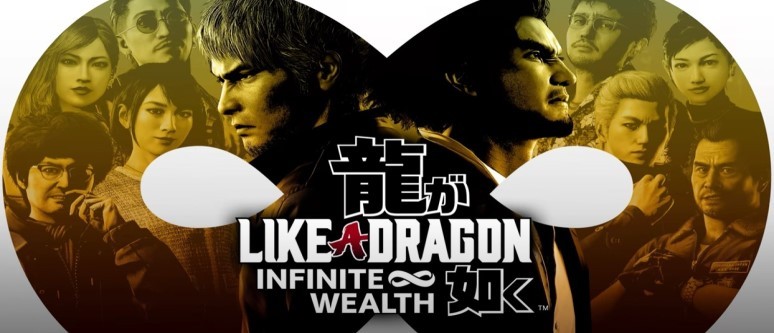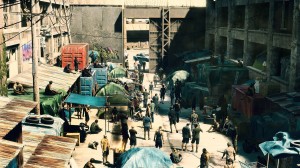Like a Dragon: Infinite Wealth

by Jordan Helsley
reviewed on PC
The Ultimate Sendup
The Yakuza/Like A Dragon series has always been a massively inspired one, and even though it's been a relatively-short 19 years, it has rapidly outgrown those inspirations. What was once a fairly straight-forward adaptation of yakuza crime fiction and film has become very much its own thing. What we have now is the mash-up of extremely self-serious storytelling and character with wacky situations and interactions that has become synonymous with the name. With Like a Dragon: Infinite Wealth, officially the 8th game in the timeline, the developers have seemingly hit the apex of their style, unless they raise the bar even higher.
Hawai'ian Dreamin'
Here's the obvious appeal: the first time venturing overseas, and the arrival in Hawaii is amazing. When you're used to the streets of various Japanese cities and neighbourhoods, the prospect of looking at America through a Like a Dragon lens becomes more appealing the more you consider it. Thanks in no small part to how the studio cut their teeth on their commentary skills with the Judgement spinoffs, they didn't disappoint. For the first time, there's a significant effort being made to not just mentioning particular issues, but actually having something to say about them. I was hesitant to believe the developers could pull it off, given their history, but the growth is shown in spades. I don't need to spell out the topics covered here, they're easy to guess and deserve to be experienced first-hand, but I will say their commentary on colonialism's effect on Hawaii as a whole was particularly surprising. It's sure to deter some, but I'd say those same people were probably never "in" on the series to begin with. Luckily, there are still lighter topics at play like the language barrier a native Japanese man would run into on a Hawaiian island. For me, the hyper-satirical-style world they’ve created made it more engaging, and added an additional character to the story.
Without all of that, it's simply a joy to walk the streets as Ichiban Kasuga, making friends left and right by simply throwing up a Shaka and saying "aloha," or slamming your shoulder into a palm tree to get some fruit. While there's still plenty of fighting throughout the runtime, these streets are more friendly and fun to align with the lovable oaf himself. Ichiban is still growing in many aspects, but he continues to set himself apart from mainstay Kiryu with his flamboyance, and that has been allowed to intersect with the world around him more than before. Sadly, by the end of this marathon there weren't many additional layers added to our main character, but they're clearly in it for the long haul.
Fighting Fantasy
The turn-based combat returns from the previous game, though expanded and iterated on. The real-time element is now more impactful. Moving your attackers around in 3D space is critical to setting up particular environmental or combo attacks is critical to success and as engaging as can be. I even had several failed encounters that I was able to successfully re-engage with simply by positioning differently (along with some advantageous enemy positioning) for maximum efficiency. Some skills have knockback, for instance, so a particularly tough enemy might get knocked into another ally for a free hit, or oncoming traffic for something more devastating. With a playtime that topped 80 hours, I'd call it a critical success that the combat never got stale, and that's largely due to the evolution of JRPG combat.
Fights are also a joy to watch. Ichiban's childish exuberance allows his imagination to transform enemies into all types of dregs and creatures, and does things like explain "electric magic attacks" as a jolt from a car battery. They're flashy, challenging at times, funny, and satisfying. As your party levels up and unlocks new moves, there's an excitement to use them for the first time and check out how crazy the higher level stuff truly gets.
Being a JRPG, the grind concerns are natural, and even though I didn't feel excessive pressure on this front, some of this has been mitigated through the use of the "Beatdown" mechanic. Random encounters with severely out-levelled enemies can be resolved in a single button press, allowing you to take your meagre reward and move on to bigger fish. There were a few moments where the physics of the world ruined the otherwise satisfying combat, but the bugs were infrequent enough. What became more frustrating was the game's "perfect block" system. Performing a block at the point of impact would lessen the incoming damage, however the camera would frequently lag behind the action so much that the impact had already happened by the time the focus shifted. It only truly became an issue with long, drawn out fights, but those can be the worst to lose without a proper fighting chance.
Layers Like a Coconut
Significant attention also needs to be paid to Like a Dragon: Infinite Wealth's many side activities, including a few that are so fleshed out they could be their own games. In particular, Dondoko Island, a veritable Animal Crossing in its own right, is much too good to be considered an afterthought. Just about every element you'd expect from an island management game is here, as well as theme park elements, making it devilishly easy to get lost for hours or days on what is a very siloed off and separated side activity. It truly is a test, once you unlock this island, of how invested in the main story you are. I spent a majority of my time there post-game, but it did initially delay my progress for far longer than I anticipated. It even has remnants of Yakuza's brawling combat, albeit thinned out.
So many of these tangential activities feel as refined as the combat and storytelling, even if they aren't all full experiences. I’m slightly disappointed we didn't get a considered surfing mini game, but the Crazy Taxi-like delivery one was fun for at least a few runs, the Pokémon parody was another one with a ton of depth, and the inclusion of a playable version of the arcade-exclusive SpikeOut was a bonus treat.
The New Era
When you finally break away from the side activities and finish the story, after all of its twists and turns, I think it will provide a large amount of satisfaction, even if it isn't flawless. The ending in particular feels like it pulls a punch or two, but the journey was worthwhile regardless. It's a visually splendorous affair full of well-built characters both new and existing. Even the matching of Ichiban and Kiryu avoids either feeling like a sidekick, though even the sidekicks are given their chances to shine, if you take the time to foster those relationships. I'll say even less about some of the villains, but I found at least one of them to be incredible.
Like a Dragon: Infinite Wealth is a special game in that it's a JRPG that runs over two full-time weeks, has plenty of cutscenes and dialogue, and an expansive area to explore, but it never once felt long. There's a constant pull, a strong one, towards the next piece of story, the next upgrade, the next wild experience, and it always ensures you're not left behind by reiterating story points and providing flashbacks. Each component blends together better than ever before, truly making the transition from Yakuza to Like a Dragon complete, and with it an evolution from an inspired game series to an inspiration to others.
As always, follow us on Instagram for news updates, reviews, competitions and more.
9.5
fun score
Pros
Refined and evolved combat system, mature and joyful story, and tons of depth
Cons
Story doesn’t quite nail the ending, and a few combat bugs made things more frustrating than necessary.







